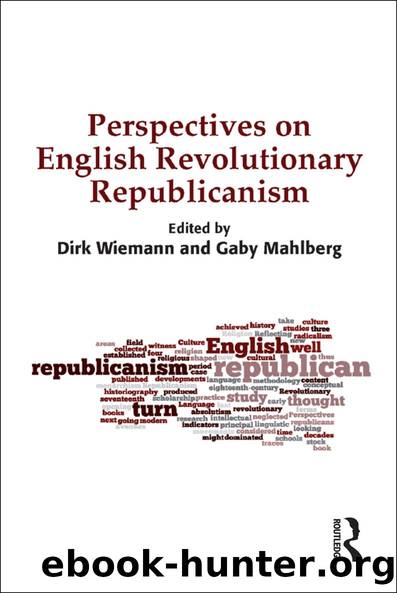Perspectives on English Revolutionary Republicanism by Dirk Wiemann Gaby Mahlberg

Author:Dirk Wiemann, Gaby Mahlberg [Dirk Wiemann, Gaby Mahlberg]
Language: eng
Format: epub
Tags: History, Modern, 17th Century, Europe, Great Britain, General, Literary Criticism, Renaissance
ISBN: 9781472404121
Google: RDc9AwAAQBAJ
Publisher: Ashgate Publishing, Ltd.
Published: 2014-04-28T16:15:30+00:00
Writing against the Other: Aesthetic Panic and the Body of Language
As has been pointed out above, during the late Middle Ages and the early modern period, the kingâs body had assumed the characteristics of the corpus Christi. Simultaneously, since the Reformation, the body of Christ had also become the key for understanding the textual corpus of the Bible in Protestant hermeneutics: in analogy to Christâs body and its role in the Christian plan of salvation, the Bible itself figured as an organic whole with different, interconnected members.48 If one considers, however, that, in the long run, the long-standing alliance between the Reformation, book printing, and capitalist forms of distribution and consumption were constitutive factors for the coming into being of the modern notion of ânationâ and ânationalismâ at the end of the eighteenth century,49 it becomes comprehensible that the semantic metamorphosis of the trope of the body politic after the French Revolution was closely connected to a change in the understanding of writing and the written, or rather, printed, word: âThe typecase took the place of the sacral body of the king.â50 As Ingeborg Harms has persuasively argued, the former connectedness between biblical hermeneutics, printing, and the holiness of Christâs body could be reinterpreted with respect to the nation as a convention of equals:
Die Elemente des Druckerkastens kommen dem Selbstgefühl der Revolutionäre entgegen. Sie sind in keine vorgegebenen Zusammenhänge eingespannt und können sich beliebig assoziieren.⦠Wie der Revolutionär erhält auch der Buchstabe erst im Kollektiv seinen Sinn. Der Egalität der Bürger entspricht die einheitliche Druckerschwärze.
[The elements of the typecase meet the revolutionariesâ sense of self. They are not harnessed by prescribed contexts and are free to associate.⦠Like the revolutionary, the letter only gains its meaning in the collective. The uniform printing ink is in keeping with the equality of the citizens.]51
It is still surprising to recall that Burke wrote his text more than two years before Louis XVI was executed. This âanteriorityâ, though, makes Reflections all the more indicative of the way in which the conception of the body politic was itself revolutionised in the 1790s. Especially when taking into account the textuality of the Reflections, it seems as if Burke attempted to write against the âhacking into piecesâ, the republican dismemberment of traditional meaning constellations. It would be plausible to reconstruct not only Burkeâs revolutionary French contemporaries but also his fellow English republican antecedents as the implied opponents against whom he polemically pits his version of the body politic as one organic whole. Had not John Milton expressly derided those âwho perpetually complain of schisms and sectsâ and instead conjured up the âmanglâd body of Osirisâ, âhewed ⦠into a thousand peecesâ, as an example of the necessary incompleteness of earthly affiliations that âcannot be united into a continuity [but] can only be contiguous in this worldâ?52 As if in an attempt to exorcise such a dangerously fragmenting legacy, Burke, particularly in the infamous aesthetic passages in the Reflections in which he obviously attempted to mobilise his readersâ
Download
This site does not store any files on its server. We only index and link to content provided by other sites. Please contact the content providers to delete copyright contents if any and email us, we'll remove relevant links or contents immediately.
| Africa | Americas |
| Arctic & Antarctica | Asia |
| Australia & Oceania | Europe |
| Middle East | Russia |
| United States | World |
| Ancient Civilizations | Military |
| Historical Study & Educational Resources |
Machine Learning at Scale with H2O by Gregory Keys | David Whiting(4313)
Never by Ken Follett(3957)
Fairy Tale by Stephen King(3399)
Oathbringer (The Stormlight Archive, Book 3) by Brandon Sanderson(3214)
The Man Who Died Twice by Richard Osman(3079)
Will by Will Smith(2920)
Rationality by Steven Pinker(2364)
Can't Hurt Me: Master Your Mind and Defy the Odds - Clean Edition by David Goggins(2341)
The Dark Hours by Michael Connelly(2308)
Friends, Lovers, and the Big Terrible Thing by Matthew Perry(2230)
The Dawn of Everything: A New History of Humanity by David Graeber & David Wengrow(2209)
Principles for Dealing With the Changing World Order: Why Nations Succeed and Fail by Ray Dalio(2055)
A Short History of War by Jeremy Black(1848)
HBR's 10 Must Reads 2022 by Harvard Business Review(1844)
Go Tell the Bees That I Am Gone by Diana Gabaldon(1758)
A Game of Thrones (The Illustrated Edition) by George R. R. Martin(1745)
Kingdom of Ash by Maas Sarah J(1678)
515945210 by Unknown(1667)
443319537 by Unknown(1559)
